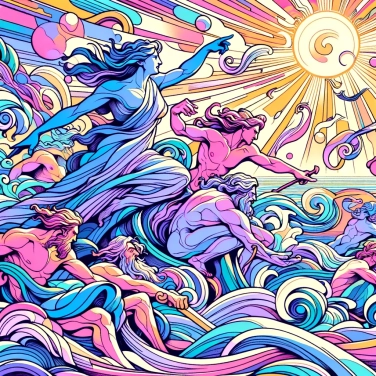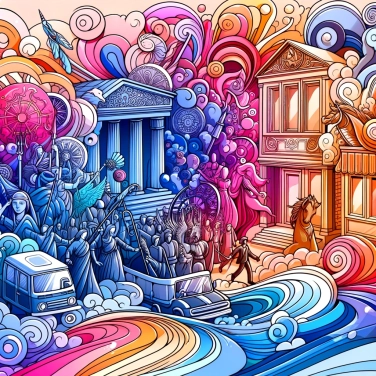Greek myths have influenced Western art and literature due to their depth of symbolism, rich array of characters and stories, and their ability to reflect universal aspects of the human experience.

Greek myths address emotions and existential questions that every human being experiences: fear, love, jealousy, the search for meaning. Through emblematic characters like Icarus, a symbol of perilous ambition, or Oedipus, an embodiment of tragic fate, myths speak to everyone. Their simple yet rich narratives, filled with strong imagery, remain familiar regardless of the century. They do not merely recount divine or heroic adventures; they primarily express universal truths about humanity, its qualities, faults, and deepest challenges. That is why they have withstood the test of time without aging a bit.
Greek myths have always been a goldmine for artists. The stories of Icarus flying too close to the sun or Medusa and her snakes have appeared in paintings, sculptures, and pottery since antiquity. A host of Renaissance artists like Botticelli (with his famous Birth of Venus) and Michelangelo drew directly from these myths to express beauty, suffering, or heroism. Even today, these tales inspire amazing works, whether in illustrations, street art, or even cinema, serving as universal visual or symbolic references.
Greek mythological tales have given a significant boost to Western writers since antiquity. The great tragedies of Sophocles and Euripides are the first examples, but later authors like Shakespeare, Racine, and even Goethe reappropriated these myths, telling stories of fate, passion, and human dramas in their own way. For instance, Shakespeare drew from Greek legends to infuse tragedy into Hamlet based on the myth of Orestes, and Racine uses the romantic torments of Phaedra to discuss jealousy and guilt. More recently, mythology has inspired modern authors such as James Joyce, whose Ulysses completely revisits Homer's Odyssey, and Albert Camus, who takes the character of Sisyphus to speak about the meaning of life. The strength of these Greek tales lies in their ability to address timeless universal themes, such as the quest for self, existential doubt, ambition, in short, the big questions that still captivate everyone today, from famous authors to average readers.
Greek myths often address universal existential and moral questions. Stories like that of Icarus, who embodies excessive ambition, or Prometheus, symbolizing rebellion against the gods to bring knowledge to humanity, raise questions about the limits of humanity. All these topics have inspired philosophers and writers since antiquity, dramatizing dilemmas surrounding concepts like fate, responsibility, or divine justice. In literature, this leads to reflection on the consequences of our choices, while in art, the visual representation of these myths offers an accessible reflection on virtues, vices, and human ethics. Myths thus function as true philosophical mirrors, constantly reflecting our own behaviors, pretensions, and weaknesses.
Even today, Greek myths have not aged a bit and continue to inspire works of all kinds. Many authors revisit the story of Odysseus, as seen in the bestselling novel "The Odyssey of Penelope" by Margaret Atwood. In cinema, Hollywood regularly bets on the adventures of Hercules, Perseus, or the epic battles surrounding Troy. The video game "God of War" brings these tales to a contemporary audience, featuring ancient heroes like Kratos, a warrior tortured by his fate. Even modern pop culture draws from figures such as Medea, Orpheus, or the gods of Olympus, remixed in various forms: TV series, comics, or manga. Greek myths provide universal stories that people still identify with today—proof that despite their thousands of years on the clock, they still tell us so much about what it means to be human.
Did you know that Greek mythology directly inspired the creation of many modern characters, such as Wonder Woman, whose origins are based on the legends of the ancient Amazons?
Did you know that the concept of the "Oedipus complex" formulated by Sigmund Freud comes directly from the Greek myth of Oedipus, famous for unknowingly killing his father and marrying his mother?
Did you know that the European currency "Euro" frequently uses references to Greek mythology? For example, the abduction of Europa by Zeus, who transformed into a bull, adorns some 2-euro coins.
Did you know that the legendary Trojan War, told by Homer, has inspired countless artistic works, such as Shakespeare's play "Troilus and Cressida" and Berlioz's opera "The Trojans"?
Among the most famous examples are Homer's 'The Iliad' and 'The Odyssey,' Sophocles' 'Oedipus Rex,' Ovid's 'Metamorphoses,' as well as more recent works such as James Joyce's 'Ulysses' and Jean Giraudoux's 'The Trojan War Will Not Take Place.'
This influence can be seen in a multitude of artistic works, ranging from Renaissance paintings such as Botticelli's 'The Birth of Venus', to neoclassical sculptures, as well as modern interpretations in cinema and contemporary digital arts.
Greek philosophy brings a moral and existential depth to myths. Philosophers like Plato and Aristotle used myths to illustrate their ideas, having a lasting influence on how Western artists and writers have explored questions about humanity and existence.
Mythology is more about symbolic and imaginary narratives intended to convey moral, philosophical, or spiritual lessons, while ancient Greek history seeks to recount verifiable and documented events.
Greek mythological tales address timeless themes such as love, power, ambition, and tragedy. Their universal nature allows contemporary artists to create relevant adaptations that still resonate in our current society.

No one has answered this quiz yet, be the first!' :-)
Question 1/5